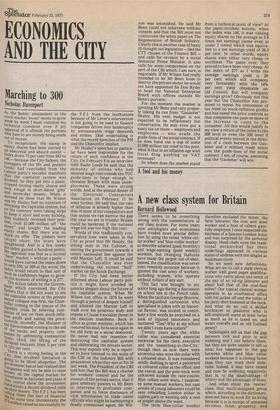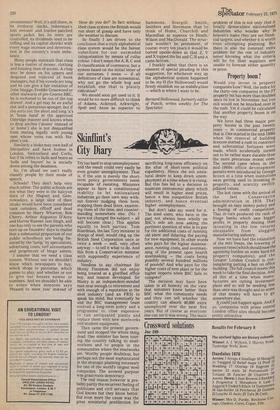A fool and his money
A new class system for Britain
Bernard Hollow ood
There seems to be something wrong with the nomenclature of our class system. For some years now sociologists and economists have evaded more precise definition by using the terms 'white-collar worker' and 'blue-collar worker' to describe salaried (paid monthly) and wage-earning (paid weekly) workers, but changing fashions have made the jargon out-of-date. Indeed, the classification was never even remotely accurate because it ignored the vast army of workers, including women, who operate without collars of any sort.
This fact was brought to my notice long ago during a discussion on school ties at the Punch table. When the taciturn George Morrow, a distinguished cartoonist who specialised in jokes with an historical flavour, was invited to contribute a few words he switched on a look of injured innocence and muttered "Ties? Why at my school we didn't even have collars!"
Twenty years ago the white collar was considered essential neckwear for the clerk, executive and the 'something-in-the-City,' though then as now there were eccentrics who wore the collar with a coloured shirt. It was considered mildly dashing to sport a patterned or coloured collar at the office, and the cravat and the polo-neck were
unknown outside the race-course. Blue collars were worn, I suppose,
by some manual workers, but vast armies of young labourers could be seen rebuilding London either in topless garb or wearing only a vest or singlet above the waist.
The term blue-collar worker therefore excluded, the miner, the farm labourer, the iron and steel worker and a host of others gainfully employed. I once inspected the kitchens of a famous London hotel and was surprised by the sartorial display. Head chefs wore the traditional neckerchief but their underlings appeared in various states of undress with the singlet as maximum cover.
So we need new definitions. What are we to call a male clerical worker with good paper qualifications who earns about one tenth of the pay of an oil-rig labourer and about half that of the coal-face miner? Our typical clerical worker operates in an overheated office with his jacket off and the collar of his jazzy shirt loosened at the neck. And what do we call a skilled bricklayer or plasterer who is self-employed, earns at least twice as much as he is taxed on, and wears overalls and an old football Jersey? Sociologists tell us that the gap between rich and poor is still widening and 1 can believe them, but they are quite unable to tell us what has happened to the gap between white and blue collar workers because it is closing faster than they can work their sliderules. Indeed, it may have closed and now be widening negatively; that is, to thp disadvantage of whitey and the advantage of bluey. And what about the 'rentier' class, that much-maligned group which, according to the dictionary, does not have to work for its living because it is in receipt of unearned incomes from property and investments? Well, its still there, in its corduroy slacks, fisherman's knit sweater and leather-patched sports jacket, but its rents are controlled, its dividends tend to be trifling and its capital shrink S with every wage increase and deterioration in the country's trade imbalance.
Many people maintain that class is less a matter of money, clothing and housing than of accent. A chap may be down on his uppers and despised and rejected of bank managers, but if his vowels are long and he can give a fair imitation of John Snagge, Freddie Grisewood or other stalwarts of pre-Greene BBC, he is reckoned to be out of the top drawer. And a gel may be an awful slut and a penurious sponger, but if she sorts out the short and long 'a's in 'brass band' in the approved Oxbridge manner and knows when to drop aitches ('atome' instead of 'at home') she is not disqualified from mating legally with young men whose veins run with Stephen's ink.
Similarly a bloke may own half of Shropshire and have homes in London, Switzerland and Corfu, but if he refers to bulls and bears as 'bolls and bayers' he is socially down among the deadmen.
So, I'm afraid we can't really classify people by their mode of speech.
Schools? They don't help very much either. The public schools are not what they were in the halcyon days of the Magnet and Gem: nowadays, a large slice of their intake would have been considered rank outsiders, riffraff and dead common by Harry Wharton, Bob Cherry, Arthur Augustus D'Arcy and Hurree Ramset Jam Singh, and one has only to see the parents who turn up on founders' days to realise that a substantial proportion of our public schoolboys are being financed by the 'lump,' by speculators, advertising touts, turf accountants and proprietors of bingo salons..
I assume that we need a class system. Without one we shouldn't know which newspapers to buy, which shops to patronise, which games to play, and whether or not to give our houses names or numbers. And we shouldn't be able to wince when someone says 'Pleased to meet you' instead of 'How do you do?' In fact without their class system the British would run short of gossip and have only the weather to discuss.
So finally I am driven to the conclusion that a truly alphabetical class system would be the fairest substitute for our outmoded categorisation by means of collar colour. I don't mean the A, B, C and D classification of commerce, but a system based on the initial letter of our surnames. I mean — if all definitions of class are nonsensical, why not go the whole hog and establish one that is plainly ridiculous?
We should soon get used to it. It would be no more difficult to think of Adams, Ackroyd, Arkwright, Spell and Axon as superior to Sammons, Scargill, Smith, Smithers and Stevenson than to think of Home, Churchill and Macmillan as superior to Heath, Wilson and MacDonald. The structure wouldn't be permanent, of 'course: every ten years it would be turned upside-down so that Z, Y and X topped the list and C, B and A came bottom.
I frankly admit that there is an element of .special pleading in this suggestion, for whichever way up the alphabetical system happened to be, my H (for Hollowood) would firmly establish me as middle-,class — which is where I want to be.
Bernard Hollo wood, formerly editor of Punch, writes weetz/y for The Spectator.



































 Previous page
Previous page